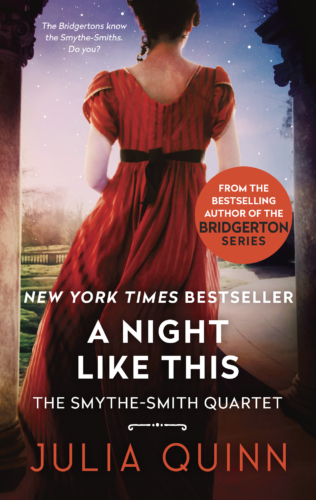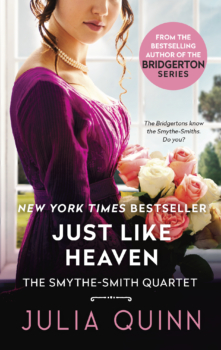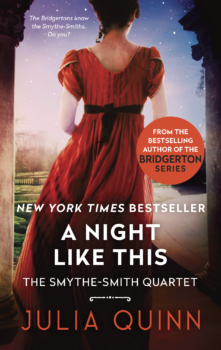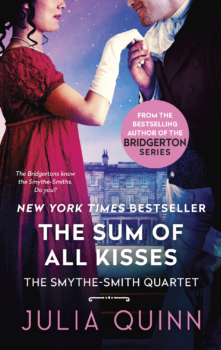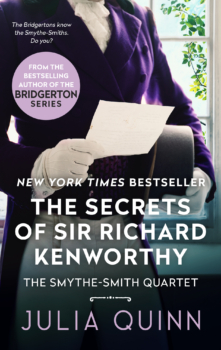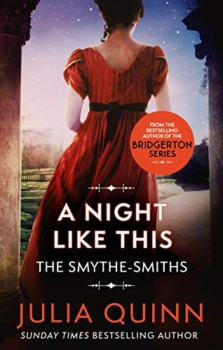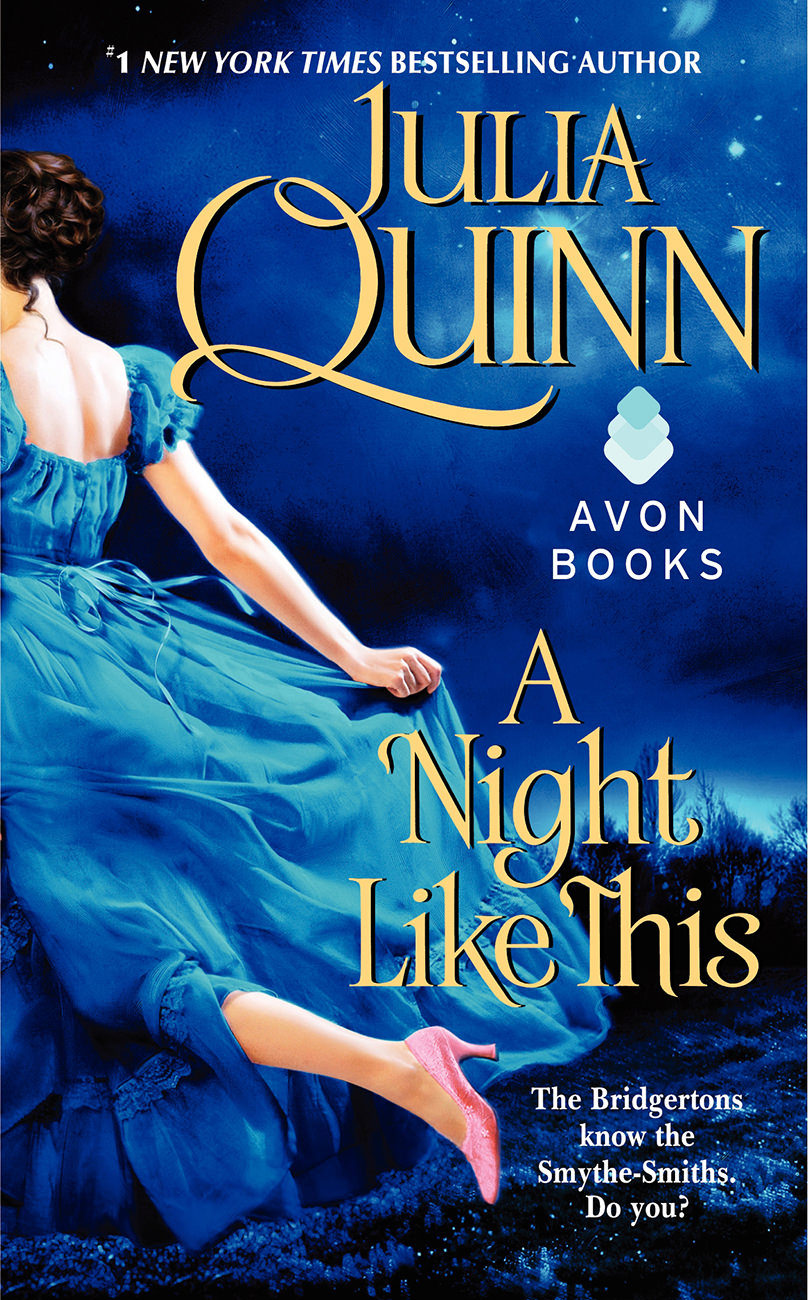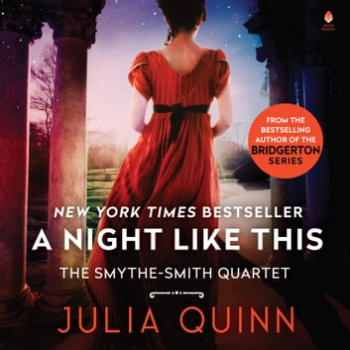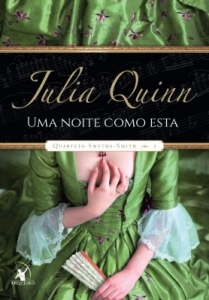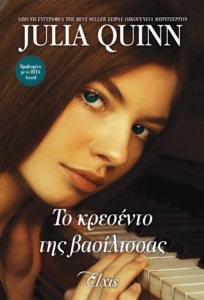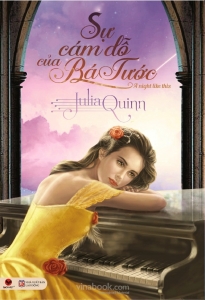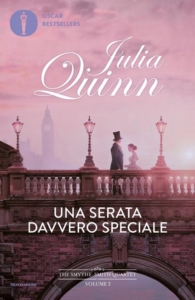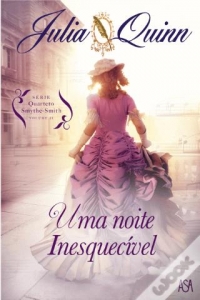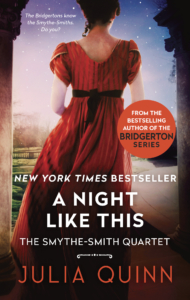A Night Like This
Book 2 in the
Smythe-Smith Quartet
She might not be who she says she is…
But Anne Wynter is managing quite well as a governess to three highborn young ladies. Her job can be a challenge— in a single week she finds herself hiding in a closet full of tubas, playing an evil queen in a play that might be a tragedy (or might be a comedy— no one is sure), and tending to the wounds of the oh-so-dashing Earl of Winstead. After years of dodging unwanted advances, he’s the first man who has truly tempted her, and it’s getting harder and harder to remind herself that a governess has no business flirting with a nobleman.
He might be in mortal danger…
But that’s not going to stop Daniel Smythe-Smith from falling in love. And when the young earl spies a mysterious woman at his family’s annual musicale, he vows to pursue her, even if that means spending his days with a ten-year-old who thinks she’s a unicorn. But Daniel has an enemy, one who has vowed to see him dead. And when Anne is thrown into peril, he will stop at nothing to ensure their happy ending…
From #1 New York Times bestselling author, and creator of the Bridgerton series, Julia Quinn presents the second, stunning installment in the Bridgerton adjacent Regency era-set world featuring the romantic adventures of the well-meaning but less-than-accomplished Smythe-Smith musicians. In this case, a distractingly lovely pianist sitting in at the annual Smythe-Smith musicale catches the eye of a haunted, hunted man in desperate need of redemption. Bridgerton fans will cry, “Encore!”
 Start Reading Now
Start Reading Now
 Explore Inside this Story
Explore Inside this Story

Books in this series:
Find out more about the Smythe-Smith Quartet →
-
Quinn-tessential Quote
“Love is blind,” Harriet quipped.
“But not illiterate,” Elizabeth retorted. -
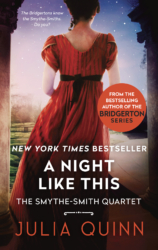
Inside the Story:
JQ’s Author Notes- Harriet Pleinsworth first made her first appearance in It's in His Kiss when Hyacinth and Gareth discovered that what they thought was to be a poetry reading had been changed to a performance of an original composition—The Shepherdess, the Unicorn, and Henry VIII. Written, of course, by Harriet Pleinsworth. It's in His Kiss takes place one year after A Night Like This, so I had a lot of fun setting up the pieces of Harriet’s future “masterwork.”
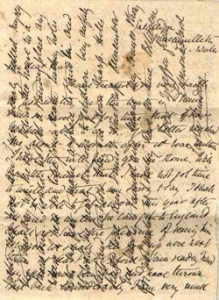
Public domain as per Wikimedia Commons. - I have always been fascinated by postal systems and had great fun researching how Anne might send letters to her sister. At the time of A Night Like This, postage was paid by the recipient of a letter, not the sender. Since postage was calculated in part by the number of sheets in the letter, many people economized by writing “crossed” letters. After filling a sheet with words, the writer would turn the paper ninety degrees and start again. It looks difficult to read to me, but I’m told that it’s not so bad once you get the hang of it. Members of Parliament (including peers sitting in the House of Lords) were able to send letters without charge. This was called “franking,” or using their “free frank.” All they had to do was sign their name on the front of the letter. As you can probably imagine, the privilege of the free frank was widely abused.
- You wouldn’t think it would be nearly impossible to include a reference to a Shakespearean play, but I had a fiendishly difficult time figuring out the proper way to mention Henry VI, Part II. That’s what I had in my manuscript, but my copyeditor changed it to Henry VI, Part 2. This crazy half-italicized version looked completely wrong to me so I went online and the very first reference I found was: Henry VI, Part 2. In my agony, I asked my husband what he thought. He very wisely grabbed our copy of The Complete Works of Shakespeare, and we found The Second Part of Henry VI. And as if that weren’t enough, I stumbled on an academic website that listed it as 2 Henry VI. At this point, I did what I should have done in the first place. I emailed Eloisa James, whose day job happens to be Brilliant Shakespeare Professor. She informed me that academics do refer to the play as 2 Henry VI and that she thought that in conversation people would have said The Second Part of Henry VI. Is anyone dizzy yet? I decided to eliminate the problem and change it to Macbeth. But then guess what happened? My proofreader noticed that I had forgotten to change an earlier reference to the play and I was scolded for calling Macbeth a history instead of a tragedy. I ended up changing it back to Henry VI, Part II. Which is what I had in the first place.
- All of the inns mentioned at the end of the book are real inns in Hampstead. The Spaniards Inn (where much of the action takes place) is one of the oldest inns in London and has quite a storied history. Dick Turpin, the famed highwayman, was apparently born there, and Charles Dickens mentioned it in The Pickwick Papers. I don’t believe you can stay at the inn any longer, but the restaurant and garden are very popular.
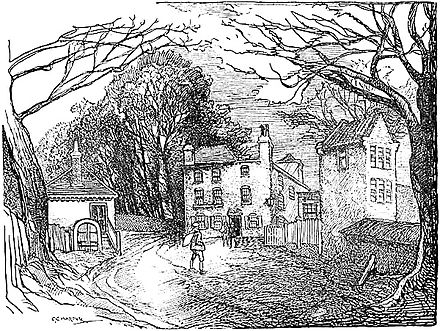
"The Spaniards,Hampstead Heath". from The Old Inns of Old England, Volume I (of 2), by Charles G. Harper page 323. Illustration by author. Published in London in 1906 by CHAPMAN & HALL, Limited. Public domain image.

Bonus Features
Enjoy an Excerpt
from
A Night Like This
Prologue
“Winstead, you bloody cheat!”
Daniel Smythe-Smith blinked. He was a little bit drunk, but he thought someone had just accused him of cheating at cards. It had taken him a moment to be sure; he’d been the Earl of Winstead for barely a year, and he still sometimes forgot to turn when someone called him by his title.
But no, he was Winstead, or rather Winstead was he, and…
His head did a bob and then a weave. What was it he had been thinking?
Oh, right. “No,” he said slowly, still rather puzzled by the whole thing. He raised his hand to protest, because he was quite certain he hadn’t been cheating. In fact, after that last bottle of wine, it was possibly the only thing he was certain of. But he didn’t manage to say anything more. In fact, he was barely able to hop out of the way when the table came crashing toward him.
The table? Holy hell, how drunk was he?
Sure enough, the table was now sideways and the cards were on the floor, and Hugh Prentice was screaming at him like a lunatic.
Hugh must be drunk, too.
“I didn’t cheat,” Daniel said. He lifted his brows and blinked, as if the owlish motion might remove the filmy layer of intoxication that seemed to obscure, well, everything. He looked over at Marcus Holroyd, his closest friend, and shrugged. “I don’t cheat.”
Everyone knew he didn’t cheat.
But Hugh had clearly lost his mind, and Daniel could only stare at him as he raved, arms waving, voice rising. He brought to mind a chimpanzee, Daniel thought curiously. Minus all the fur.
“What is he talking about?” he asked, to no one in particular.
“There is no way you could have had the ace,” Hugh railed. He lurched toward him, one of his arms outstretched in an unsteady accusation. “The ace should have been over… over…” He shook his hand at some spot in the general vicinity of where the table had been. “Well, you shouldn’t have had it,” he muttered.
“But I did,” Daniel told him. Not angrily, not even defensively. Just matter-of-fact, and with a what-else-is-there-to-say sort of shrug.
“You couldn’t,” Hugh shot back. “I know every card in the deck.”
It was true. Hugh always knew every card in the deck. His mind was freakishly sharp that way. He could do maths in his head, too. The complicated kind, with more than three digits and borrowing and carrying and all that rot they’d been forced to practice endlessly at school.
In retrospect, Daniel probably shouldn’t have challenged him to a game. But he’d been looking for amusement, and honestly, he had expected to lose.
No one ever won a game of cards against Hugh Prentice.
Except, apparently, him.
“Remarkable,” Daniel murmured, looking down at the cards. True, they were now scattered on the floor, but he knew what they were. He’d been as surprised as anyone else when he’d laid down the winning hand. “I won,” he announced, even though he had a feeling he’d said as much already. He turned back to Marcus. “Fancy that.”
“Are you even listening to him?” Marcus hissed. He clapped his hands in front of Daniel’s face. “Wake up!”
Daniel scowled, scrunching his nose at the ringing in his ears. Really, that had been uncalled for. “I am awake,” he said.
“I will have satisfaction,” Hugh growled.
Daniel regarded him with surprise. “What?”
“Name your seconds.”
“Are you challenging me to a duel?” Because that was what it sounded like. But then again, he was drunk. And he rather thought Prentice was, too.
“Daniel,” Marcus groaned.
Daniel turned. “I think he’s challenging me to a duel.”
“Daniel, shut up.”
“Pfft.” Daniel brushed Marcus off with a wave of his hand. He loved him like a brother, but he could be so stodgy sometimes. “Hugh,” Daniel said to the furious man in front of him, “don’t be an ass.”
Hugh lunged.
Daniel jumped out of the way, but not fast enough, and both of them went crashing to the floor. Daniel had a good ten pounds on him, but Hugh had rage, whereas Daniel just had befuddlement, and Hugh got at least four punches in before Daniel managed even his first.
And even that didn’t make contact because Marcus and a few other people had leapt between them, pulling them apart.
“You’re a bloody cheat,” Hugh rasped, struggling against the two men holding him back.
“You’re an idiot.”
Hugh’s face darkened. “I will have my satisfaction.”
“Oh, no you won’t,” Daniel spat. At some point –probably when Hugh had slammed his fist into his jaw– Daniel’s confusion had given way to fury. “I will have satisfaction.”
Marcus groaned.
“The Patch of Green?” Hugh said coolly, referring to the secluded spot in Hyde Park where gentlemen sorted their differences.
Daniel’s eyes leveled against his. “At dawn.”
There was a hushed silence, as everyone waited for either man to come to his senses.
But they didn’t. Of course they didn’t.
The corner of Hugh’s mouth tipped up. “So be it.”
“Oh, bloody hell,” Daniel groaned. “My head hurts.”
“Really,” Marcus said sarcastically. “Can’t imagine how that came to be.”
Daniel swallowed and rubbed his good eye. The one Hugh hadn’t blackened the night before. “Sarcasm doesn’t become you.”
Marcus ignored him. “You can still put a stop to this.”
Daniel glanced around, at the trees surrounding the clearing, at the green, green grass that spread before him, all the way to Hugh Prentice and the man next to him, inspecting his gun. The sun had come up barely ten minutes earlier, and the morning dew still clung breathlessly to every surface. “It’s a little late for that, don’t you think?”
“Daniel, this is idiocy. You have no business shooting a pistol. You’re probably still foxed from last night.” Marcus looked over at Hugh with an alarmed expression. “And so is he.”
“He called me a cheat.”
“It’s not worth dying for.”
Daniel rolled his eyes. “Oh, for heaven’s sake, Marcus. He’s not actually going to shoot me.”
Again, Marcus looked over at Hugh with concern. “I wouldn’t be too sure of that.”
Daniel dismissed his worries with another roll of his eyes. “He’ll delope.”
Marcus shook his head and walked over to meet Hugh’s second in the middle of the clearing. Daniel watched as they inspected the guns and conferred with the surgeon.
Who the bloody hell thought to bring a surgeon? No one actually shot each other at these things.
Marcus came back, his expression grim, and handed Daniel his gun. “Try not to kill yourself,” he muttered. “Or him.”
“Will do,” Daniel said, keeping his voice just jaunty enough to annoy the hell out of Marcus. He took his mark, raised his arm, and waited for the count of three.
One.
Two.
Thr–
“Bloody hell, you shot me!” Daniel yelled, looking up at Hugh with furious shock. He looked down at his shoulder, now oozing with blood. It was just a muscle wound, but good God, it hurt. And it was his shooting arm. “What the hell were you thinking?” he shouted.
Hugh just stood there staring at him like a moron, as if he hadn’t realized that a bullet could draw blood.
“You bloody idiot,” Daniel muttered, raising his gun to shoot back. He aimed off to the side –there was a nice, thick tree that could take a bullet– but then the surgeon came running over, blathering on about something, and as Daniel turned toward him, he slid on a damp patch, and his finger tightened on the trigger, taking the shot before he’d meant to.
Damn, the recoil hurt. Stupid–
Hugh screamed.
Daniel’s skin turned to ice and with dawning horror, he raised his eyes to the spot where Hugh had once stood.
“Oh my God.”
Marcus was already running over, as was the surgeon. There was blood everywhere, so much of it Daniel could see it seeping through the grass, even from across the clearing. His gun slipped from his fingers and he stepped forward, trancelike.
Dear God, had he just killed a man?
“Bring me my bag!” the surgeon yelled, and Daniel took another step forward. What was he supposed to do? Help? Marcus was already doing that, along with Hugh’s second, and besides, hadn’t Daniel just shot him?
Was that what a gentleman was supposed to do? Help a man after he put a bullet in him?
“Hold on, Prentice!” someone was pleading, and Daniel took another step, and another, until the coppery stench of blood assaulted him like a blow.
“Tie it tight,” someone said.
“He’ll lose the leg.”
“Better than his life.”
“We’ve got to stop the bleeding.”
“Press harder.”
“Stay awake, Hugh!”
“He’s still bleeding!”
Daniel listened. He didn’t know who was saying what, and it didn’t matter. Hugh was dying, right there on the grass, and he had done it.
It had been an accident. Hugh had shot him. And the grass had been wet.
He’d slipped. Good God, did they know that he had slipped?
“I… I…” He tried to speak, but he had no words, and anyway, only Marcus heard him.
“You’d best stay back,” Marcus said grimly.
“Is he…” Daniel tried to ask the only question that mattered, but he choked.
And then he fainted.
When Daniel came to, he was in Marcus’s bed, a bandage wrapped tightly around his arm. Marcus sat in a nearby chair, staring out the window, which shone with the midday sun. At Daniel’s waking groan, he turned sharply toward his friend.
“Hugh?” Daniel asked hoarsely.
“He’s alive. Or at least he was last I heard.”
Daniel closed his eyes. “What have I done?” he whispered.
“His leg is mess,” Marcus said. “You hit an artery.”
“I didn’t mean to.” It sounded pathetic, but it was true.
“I know.” Marcus turned back to the window. “You have terrible aim.”
“I slipped. It was wet.” He didn’t know why he was even saying it. It didn’t matter. Not if Hugh died.
Bloody hell, they were friends. That was the most asinine part of it all. They were friends, he and Hugh. They’d known each other for years, since their first term at Eton.
But he’d been drinking, and Hugh had been drinking, and everyone had been drinking except Marcus, who never had more than one.
“How is your arm?” Marcus asked.
“It hurts.”
Marcus nodded.
“It’s good that it hurts,” Daniel said, looking away.
Marcus probably nodded again.
“Does my family know?”
“I don’t know,” Marcus replied. “If they don’t, they will soon.”
Daniel swallowed. No matter what happened, he would be a pariah, and it would rub off on his family. His older sisters were married, but Honoria had just made her debut. Who would have her now?
And he didn’t even want to think what this would do to his mother.
“I’m going to have to leave the country,” Daniel said flatly.
“He’s not dead yet.”
Daniel turned to him, unable to believe the plainness of the statement.
“If he lives, you won’t have to leave,” Marcus said.
It was true, but Daniel couldn’t imagine that Hugh would pull through. He’d seen the blood. He’d seen the wound. Hell, he’d even seen the bone, laid bare for all to see.
No one survived such an injury. If the blood loss didn’t kill him, infection would.
“I should go see him,” Daniel finally decided, pushing back against the bed. He swung his legs over the side and had almost touched down by the time Marcus reached him.
“That’s not a good idea,” Marcus warned.
“I need to tell him I didn’t mean it.”
Marcus’s brows rose. “I don’t think that’s going to matter.”
“It matters to me.”
“The magistrate may very well be there.”
“If the magistrate wanted me, he would have already found me here.”
Marcus considered that, then finally stepped aside and said, “You’re right.” He held out his arm, and Daniel took it to steady himself.
“I played cards,” Daniel said in a hollow voice, “because that’s what a gentleman does. And when he called me a cheat, I called him out, because that’s what a gentleman does.”
“Don’t do this to yourself,” Marcus said.
“No,” Daniel said darkly. He would finish. There were some things that had to be said. He turned to Marcus with flashing eyes. “I shot to the side, because that’s what a gentleman does,” he said furiously. “And I missed. I missed, and I hit him, and now I’m going to bloody well do what a man does, and go to his side, and tell him I’m sorry.”
“I will take you there,” Marcus said. It was all there was to say.
Hugh was the second son of the Marquess of Ramsgate, and he had been taken to his father’s home in St. James’s. It did not take long for Daniel to ascertain that he was not welcome.
“You!” thundered Lord Ramsgate, stretching out one arm to point at Daniel as if identifying the devil himself. “How dare you show your face here?”
Daniel held himself very still. Ramsgate had a right to be angry. He was in shock. He was grieving. “I came to–”
“Pay your respects?” Lord Ramsgate cut in derisively. “I’m sure you’ll be sorry to hear that it’s a bit early for that.”
Daniel allowed himself a glimmer of hope. “Then he lives?”
“Barely.”
“I would like to apologize,” Daniel said stiffly.
Ramsgate’s eyes, already bulbous, became impossibly huge. “Apologize? Really? You think an apology is going to save you from the gallows if my son is dead?”
“That’s not why–”
“I will see you hang. Don’t think that I won’t.”
Daniel did not doubt it for a second.
“It was Hugh who issued the challenge,” Marcus said quietly.
“I don’t care who issued the challenge,” Ramsgate snapped. “My son did what he was supposed to do. He aimed wide. But you…” He turned on Daniel then, venom and grief pouring forth. “You shot him. Why would you do that?”
“I did not mean to.”
For a moment Ramsgate did nothing but stare. “You did not mean to. That is your explanation?”
Daniel said nothing. It sounded weak to his own ears, as well. But it was the truth. And it was awful.
He looked to Marcus, hoping for some sort of silent advice, something to indicate what to say, how to proceed. But Marcus looked as lost as he felt, and Daniel supposed that they would have apologized once more and departed had not the butler entered the room just then, announcing that the doctor had come down from Hugh’s bedside.
“How is he?” Ramsgate demanded.
“He will live,” the doctor confirmed, “provided he avoids infection.”
“And the leg?”
“He will keep it. Again, if he avoids infection. But he will limp, and he may very well be lame. The bone was splintered. I set it as best I could…” The doctor shrugged. “There is only so much I can do.”
“When will you know if he has escaped infection?” Daniel asked. He had to know.
The doctor turned. “Who are you?”
“The devil who shot my son,” Ramsgate hissed.
The doctor drew back in shock, and then in self-preservation as Ramsgate stalked across the room. “You listen to me,” he said malevolently, advancing until he and Daniel were nearly nose to nose. “You will pay for this. You have ruined my son. Even if he lives, he will be ruined, with a ruined leg, and a ruined life.”
A cold knot of unease swirled in Daniel’s chest. He knew Ramsgate was upset; he had every right to be. But something more was at work here. The marquess looked unbalanced, possessed.
“If he dies,” Ramsgate hissed, “you will hang. And if he doesn’t die, if you somehow escape the rule of law, I will kill you.”
They were standing so close to one another that Daniel could feel the moist air that escaped Ramsgate’s mouth with every word. And as he looked into the older man’s glittering green eyes, he knew what it meant to be afraid.
Lord Ramsgate was going to kill him. It was only a matter of time.
“Sir,” Daniel began, because he had to say something. He couldn’t just stand there and take it. “I must tell you–”
“No, I’m telling you,” Ramsgate spat. “I don’t care who you are, or what title your godforsaken father has passed down to you. You will die. Do you understand me?”
“I think it is time we left,” Marcus intervened. He put his arm between the two men and carefully widened the space between them. “Doctor,” he said, nodding toward the physician as he ushered Daniel past. “Lord Ramsgate.”
“Count your days, Winstead,” Lord Ramsgate warned. “Or better yet, your hours.”
“Sir,” Daniel said again, trying to show the older man respect. He wanted to make this right. He needed to try. “I must tell you–”
“Don’t speak to me,” Ramsgate cut in. “There is nothing you could say that will save you now. There is no place you will be able to hide.”
“If you kill him, you will hang, too,” Marcus said. “And if Hugh lives, he will need you.”
Ramsgate looked at Marcus as if he were an idiot. “You think I will do it myself? It’s an easy thing to hire a killer. The price of a life is low indeed.” He flicked his head toward Daniel. “Even his.”
“I should leave,” the doctor said. And he fled.
“Remember that, Winstead,” Lord Ramsgate said, his eyes landing on Daniel’s with venomous disdain. “You can run, and you can try to hide, but my men will find you. And you won’t know who they are. So you will never see them coming.”
Those were the words that haunted Daniel for the next three years. From England to France, from France to Prussia, and from Prussia to Italy. He heard them in his sleep, in the rustle of the trees, and in every footfall that came from behind. He learned to keep his back to walls, to trust no one, not even the women with whom he occasionally took his pleasure. And he accepted the fact that he would never again step foot on English soil, or see his family, until one day, to his great surprise, Hugh Prentice came limping toward him in a small village in Italy.
He knew that Hugh had lived. He received the occasional letter from home. But he hadn’t expected to see him again, certainly not here, with Mediterranean sun baking the ancient town square and cries of arrivederci and buon giornio singing through the air.
“I found you,” Hugh said. He held out his hand. “I’m sorry.”
And then he uttered the words Daniel never thought he’d hear:
“You can come home now. I promise.”
Chapter One
March 1824
Cambridge, England
For a lady who had spent the last eight years trying not to be noticed, Anne Wynter was in an awkward position.
In approximately one minute, she would be forced to walk onto a makeshift stage, curtsy to at least eighty members of the crème de la crème of London society, sit at a pianoforte, and play.
That she would be sharing the stage with three other young women was some consolation. The other musicians—members of the infamous Smythe-Smith quartet— all played stringed instruments and would have to face the audience. Anne, at least, could focus on the ivory keys and keep her head bowed. With any luck, the audience would be too focused on how horrific the music was to pay any attention to the dark-haired woman who had been forced to step in at the last minute to take the place of the pianist, who had (as her mother declared to anyone who would listen) taken dreadfully— nay, catastrophically— ill.
Anne didn’t believe for one minute that Lady Sarah Pleinsworth was sick, but there wasn’t anything she could do about it, not if she wanted to keep her position as governess to Lady Sarah’s three younger sisters.
But Lady Sarah had convinced her mother, who had decided that the show must go forth. And then, after delivering a remarkably detailed seventeen-year history of the Smythe-Smith musicale, she had declared that Anne would take her daughter’s place.
“You told me once that you have played bits and pieces of Mozart’s Piano Quartet no. 1,” Lady Pleinsworth reminded her.
Anne now regretted this, deeply.
It did not seem to matter that Anne had not played the piece in question in over eight years, or that she had never played it in its entirety. Lady Pleinsworth would entertain no arguments, and Anne had been hauled over to Lady Pleinsworth’s sister-in-law’s house, where the concert was to be held, and given eight hours to practice.
It was ludicrous.
The only saving grace was that the rest of the quartet was so bad that Anne’s mistakes were hardly noticeable. Indeed, her only aim for the evening was that she not be noticeable. Because she really didn’t want it. To be noticed. For any number of reasons.
“It’s almost time,” Daisy Smythe-Smith whispered excitedly.
Anne gave her a little smile. Daisy did not seem to realize that she made terrible music.
“Joy is mine,” came the flat, miserable voice of Daisy’s sister Iris. Who did realize.
“Come now,” said Lady Honoria Smythe-Smith, their cousin. “This shall be wonderful. We are a family.”
“Well, not her,” Daisy pointed out, jolting her head toward Anne.
“She is tonight,” Honoria declared. “And again, thank you, Miss Wynter. You have truly saved the day.”
Anne murmured a few nonsensical words, since she couldn’t quite bring herself to say that it was no trouble at all, or that it was her pleasure. She rather liked Lady Honoria. Unlike Daisy, she did realize how dreadful they were, but unlike Iris, she still wished to perform. It was all about family, Honoria insisted. Family and tradition. Seventeen sets of Smythe-Smith cousins had gone before them, and if Honoria had her way, seventeen more would follow. It didn’t matter what the music sounded like.
“Oh, it matters,” Iris muttered.
Honoria jabbed her cousin lightly with her violin bow. “Family and tradition,” she reminded her. “That is what matters.”
Family and tradition. Anne wouldn’t have minded some of those. Although, really, it hadn’t gone so well for her the first time around.
“Can you see anything?” Daisy asked. She was hopping from foot to foot like a frenetic magpie, and Anne had already backed up twice, just to preserve her toes.
Honoria, who was closer to the spot from which they would make their entrance, nodded. “There are a few empty seats, but not many.”
Iris groaned.
“Is it like this every year?” Anne could not quite refrain from asking.
“Like what?” Honoria replied.
“Well, er…” There were some thing one simply did not say to the nieces of one’s employer. One did not, for example, make any sort of explicit comment about the lack of another young lady’s musical skills. Or wonder aloud if the concerts were always this dreadful or if this year was particularly bad. And one definitely did not ask— If the concerts are always so horrific, why do people keep coming?
Just then fourteen-year-old Harriet Pleinsworth came skidding in through a side door. “Miss Wynter!”
Anne turned, but before she could say anything, Harriet announced, “I am here to turn your pages.”
“Thank you, Harriet. That will be most helpful.”
Harriet grinned at Daisy, who gave her a disdainful stare.
Anne turned away so no one would see her roll her eyes. Those two had never gotten along. Daisy took herself too seriously, and Harriet took nothing seriously.
“It’s time!” Honoria announced.
Onto the stage they went, and after a brief introduction, they began to play.
Anne, on the other hand, began to pray.
Dear God, she had never worked so hard in her life. Her fingers raced across the keys, trying desperately to keep up with Daisy, who played the violin as if in a footrace.
This is ridiculous ridiculous ridiculous, Anne singsonged in her mind. It was the strangest thing, but the only way to get through it was to keep talking to herself. It was an impossibly difficult piece of music, even for accomplished players.
Ridiculous ridiculous— Ack! C-sharp! Anne flung out her right pinkie finger and hit the key just in time. Which was to say, two seconds later than it should have been.
She stole a quick glance at the audience. A woman in the front row looked ill.
Back to work back to work. Oh dear, wrong note. Never mind. No one would notice, not even Daisy.
And on she played, half wondering if she should just make up her part. It couldn’t possibly make the music any worse. Daisy was flying through her section, her volume modulating between loud and extremely loud; Honoria was plodding on, each note like a determined footfall; and Iris—
Well, Iris was actually good. Not that it mattered.
Anne took a breath, stretching her fingers during a brief pause in the piano part. Then it was back to the keys and—
Turn the page, Harriet.
Turn the page, Harriet.
“Turn the page, Harriet!” she hissed.
Harriet turned the page.
Anne struck the first chord, then realized that Iris and Honoria were already two bars ahead. Daisy was— well, good gracious, she had no idea where Daisy was.
Anne skipped ahead to where she hoped the rest of them were. If nothing else, she’d be somewhere in the middle.
“You missed some of it,” Harriet whispered.
“Doesn’t matter.”
And really, it didn’t.
And then finally, oh finally, they reached a section where Anne didn’t have to play for three entire pages. She sat back, let out the breath she’d been holding for, oh, it felt like ten minutes, and…
Saw someone.
She froze. Someone was watching them from the back room. The door through which they had entered the stage— the one which Anne was certain she’d shut with a click— was now ever so slightly ajar. And because she was the closest to the door, not to mention the only musician who didn’t have her back to it, she could see a sliver of a man’s face peering through.
Panic.
It burst through her, compressing her lungs, firing her skin. She knew this feeling. It didn’t come often, thank God, but often enough. Every time she saw someone where someone shouldn’t be…
Stop.
She made herself breathe. She was in the home of the dowager Countess of Winstead. She was as safe as safe could be. What she needed to do was—
“Miss Wynter!” hissed Harriet.
Anne jumped to attention.
“You missed your entrance.”
“Where are we now?” Anne asked frantically.
“I don’t know. I can’t read music.”
Despite herself, Anne looked up. “But you play the violin.”
“I know,” Harriet said miserably.
Anne scanned the notes on the page as fast as she could, her eyes jumping quickly from bar to bar.
“Daisy’s glaring at us,” Harriet whispered.
“Shhh.” She needed to concentrate. Anne flipped the page, took her best guess, and brought her fingers down into G minor.
And then slid over to major. That was better.
“Better” being a most relative term.
For the rest of the performance she kept her head down. She didn’t look up, not at the audience, not at the man watching her from the back room. She banged through the notes with as much finesse as the rest of the Smythe-Smiths, and when they were done, she stood and curtsied with her head still bowed, murmured something to Harriet about needing to tend to herself, and fled.
Daniel Smythe-Smith hadn’t planned to return to London on the day of his family’s annual musicale, and indeed, his ears were wishing mightily that he hadn’t, but his heart… well, that was another story.
It was good to be home. Even with the cacophony.
Especially with the cacophony. Nothing said “home” to a Smythe-Smith male like badly played music.
He hadn’t wanted anyone to see him before the concert; he’d been gone
three years, and he knew that his return would upstage the performance. The audience would probably have thanked him, but the last thing he wanted was to greet his family in front of a crowd of lords and ladies, most of whom probably thought he should have remained in exile.
But he wanted to see his family, and so as soon as he heard the music begin, he’d crept silently into the rehearsal room, tiptoed to the door, and opened it just a crack.
He smiled. There was Honoria, smiling that big smile of hers as she attacked her violin with her bow. She had no idea she couldn’t play, poor thing. His other sisters had been the same. But he loved them for trying.
At the other violin was—good heavens, was that Daisy? Wasn’t she still in the schoolroom? No, he supposed she must be sixteen by now, not yet out in society, but no longer a young girl.
And there was Iris at the cello, looking miserable. And at the piano—
He paused. Who the devil was that at the piano? He leaned a little closer. Her head was down, and he couldn’t see much of her face, but one thing was for certain— she was definitely not his cousin.
Well, now, this was a mystery. He knew for a fact (because his mother had told him so, many times) that the Smythe-Smith quartet was comprised of unmarried Smythe-Smith young ladies, and no one else. The family was rather proud of this, that they’d produced so many musically-inclined (his mother’s words, not his) female cousins. When one married, there was always another waiting to take her place. They had never needed an outsider to step in.
But more to the point, what outsider would want to step in?
One of his cousins must have taken ill. That could be the only explanation. He tried to remember who ought to be at the piano. Marigold? Did she even play piano? Viola? He thought he’d received a letter saying she’d been married. Sarah? It must have been Sarah.
He shook his head. He had a ferocious lot of female cousins.
He watched the lady at the piano with some interest. She was working very hard to keep up. Her head was bobbing up and down as she glanced at the music, and every now and then she’d wince. Harriet was next to her, turning the pages at all the wrong times.
Daniel chuckled. Whoever that poor girl was, he hoped his family was paying her well.
And then, finally, she lifted her fingers from the keys as Daisy began her painful violin solo. He watched her exhale, stretching her fingers, and then…
She looked up.
Time stopped. It simply stopped. It was the most maudlin and clichéd way of describing it, but those few seconds when her face was lifted toward his… they stretched and pulled, melting into eternity.
She was beautiful. But that didn’t explain it. He’d seen beautiful women before. He’d slept with plenty of them, even. But this… Her… She…
Even his thoughts were tongue-tied.
Her hair was lustrously dark and thick, and it didn’t matter that it had been pulled back into a serviceable bun. She didn’t need curling tongs or velvet ribbons. She could have scraped her hair back like a ballerina, or shaved it all off, and she’d still be the most exquisite creature he’d ever beheld.
It was her face, it had to be. Heart-shaped and pale, with the most amazing dark, winged brows. In the dusky light, he couldn’t tell what color her eyes were, and that seemed a tragedy. But her lips…
He dearly hoped this woman was not married, because he was going to kiss her. The only question was when.
Then— he knew the instant it happened— she saw him. Her face jerked with a tiny gasp, and she froze, her eyes widening in alarm. He smiled wryly, shaking his head. Did she think him a madman, sneaking into Winstead House to spy on the concert?
Well, he supposed it made sense. He had spent enough time being wary of strangers to recognize the trait in someone else. She didn’t know who he was, and there certainly wasn’t supposed to be anyone in the back room during the performance.
The amazing thing was, she didn’t look away. Her eyes held his, and he didn’t move, didn’t even breathe until the moment was broken by his cousin Harriet, jabbing at the dark-haired woman and presumably informing her that she’d missed her entrance.
She never looked up again.
But Daniel watched her. He watched her through every flip of the page, every fortissimo chord. He watched her so intently that at some point, he even ceased to hear the music. His mind played its own symphony, lush and full, sweeping toward a perfect, inevitable climax.
Which it never reached. The spell was broken when the quartet slammed out its final notes and the four ladies stood to make their curtsies. The dark-haired beauty said something to Harriet, who was beaming at the applause as if she had been a player herself, and then took off so quickly Daniel was surprised she didn’t leave marks on the floor.
No matter. He’d find her.
He moved quickly through the back hallway of Winstead House. He’d sneaked out himself many times when he was a young man; he knew exactly which route someone would take to escape undetected. And sure enough, he cut her off right before she rounded the last corner toward the servants’ entrance. She didn’t see him right away, though, she didn’t see him until—
“There you are,” he said, smiling as if greeting a long lost friend. There was nothing like an unexpected smile to set someone off balance.
She lurched with shock and a staccato scream flew from her lips.
“Good Lord,” Daniel said, clamping a hand over her mouth. “Don’t do that. Someone will hear you.”
He pulled her against him— it was the only way to keep a firm grip over her mouth. Her body was small and slight against his, and shaking like a leaf. She was terrified.
“I’m not going to hurt you,” he said. “I just want to know what you’re doing here.” He waited for a moment, then adjusted his position so he could see her face more directly. Her eyes met his, dark and alarmed.
“Now then,” he said, “if I let you go will you be quiet?”
She nodded.
He considered this. “You’re lying.”
She rolled her eyes, as if to say— what did you expect— and he chuckled. “Who are you?” he mused.
And then the strangest thing happened. She relaxed in his arms. A little,
anyway. He felt some of the tension lift away, felt her breath as it sighed into his hand.
Interesting. She hadn’t been worried that he didn’t know who she was. She’d been worried that he did.
Slowly, and with enough deliberation to make sure she knew he could change his mind at any time, he lifted his hand from her mouth. He didn’t remove his arm from her waist, though. Selfish of him, he knew, but he couldn’t quite bring himself to let her go.
“Who are you?” he murmured, tilting his words toward her ear.
“Who are you?” she returned.
He quirked a smile. “I asked you first.”
“I don’t speak to strangers.”
He laughed at that, and then twirled her around in his arms so that they were face-to-face. He knew he was behaving abominably, all but accosting the poor thing. She wasn’t up to anything naughty. She’d been playing in his family’s quartet, for heaven’s sake. He ought to thank her.
But he was feeling lightheaded—almost lightbodied. Something about this
woman set his blood fizzing in his veins, and he was already a bit giddy at having finally reached Winstead House after weeks of travel.
He was home. Home. And there was a beautiful woman in his arms whom he was quite certain was not planning to kill him.
It had been some time since he’d savored that particular sensation.
“I think…” he said wonderingly. “I think I might need to kiss you.”
She jerked back, not looking scared precisely, but rather puzzled. Or maybe concerned.
Smart woman. He did sound rather like a madman.
“Just a little,” he assured her. “I just need to remind myself…”
She was silent, and then, as if she could not help herself, she asked, “Of what?”
He smiled. He liked her voice. It was comforting and round, like a good brandy. Or a summer’s day.
“Of goodness,” he said, and he touched her chin, tilting her face toward his. Her breath caught— he could her the rasp of air rushing over her lips— but she did not struggle. He waited, just a moment, because if she fought him he knew he would have to let go. But she didn’t. Her eyes held his, as mesmerized by the moment as he was.
And so he kissed her. Tentatively at first, almost afraid she’d disappear in his arms. But it wasn’t enough. Passion swirled to life within him and he pulled her closer, reveling in the soft press of her body against his.
She was petite, small in that way that made a man want to slay dragons. But she felt like a woman, warm and lush in all the right places. His hand ached to close around her breast, or to cup the perfect curve of her bottom. But even he would not be so bold, not with an unknown lady in his mother’s house.
Still, he was not ready to let her go. She smelled like England, of soft rain and sun-kissed meadows. And she felt like the best kind of heaven. He wanted to wrap himself around, bury himself within her, and stay there for all of his days. He hadn’t had a drop to drink in three years, but he was intoxicated now, bubbling with a lightness he’d never thought to feel again.
It was madness. It had to be.
“What is your name?” he whispered. He wanted to know. He wanted to know her.
But she did not reply. She might have done; given more time he was sure he could have teased it out of her. But they both heard someone coming down the back stairs, just down the hall from the spot where they were still locked in their embrace.
She shook her head, her eyes wide with caution. “I can’t be seen like this,” she whispered urgently.
He let her go, but not because she’d asked him to. Rather, he saw who was coming down the stairs—and what they were doing— and he forgot all about his dark-haired vixen.
A furious cry rose from his throat, and he took off down the hall like a madman.
A Night Like This
by Julia Quinn
is available in the following formats:
Mass Market Paperback:
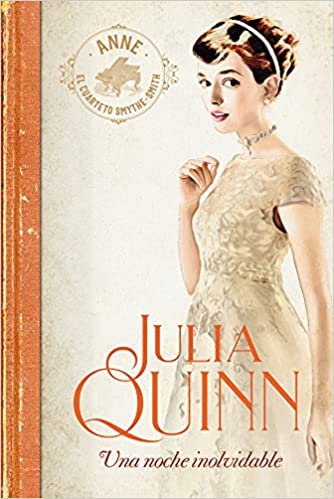
En Español
Not ready to order yours? Check out this story's overview. Read the excerpt. Listen to a bit on audio. Find out more about the series. There’s so much to love!
Awards & Achievements
- A Night Like This was selected as Library Journal's top Summer Romance Read of 2012.
-
 A Night Like This spent four weeks on the New York Times bestseller list, peaking at #4.
A Night Like This spent four weeks on the New York Times bestseller list, peaking at #4. - A Night Like This spent five weeks on the USA Today list, debuting at #10.
